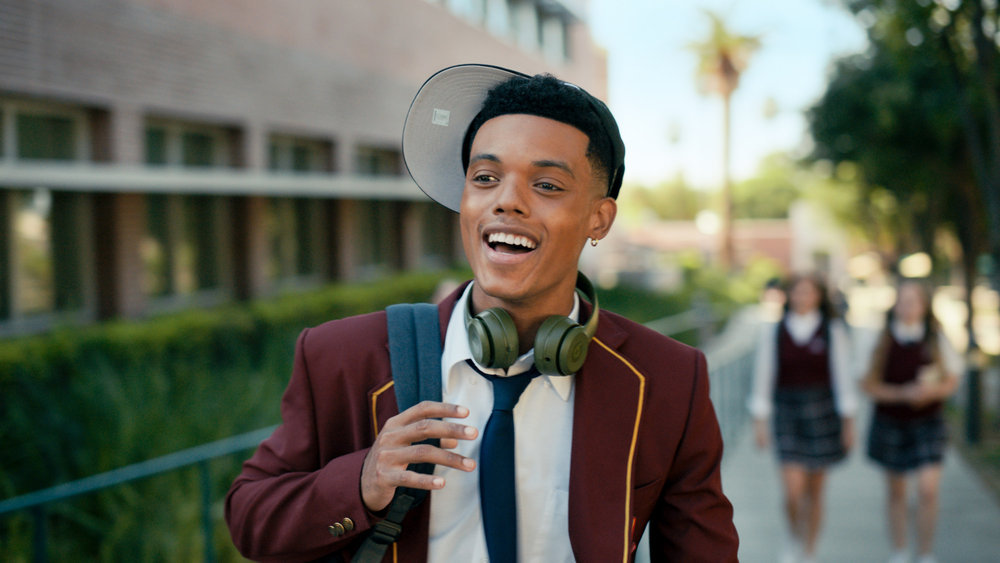“Bel-Air,” the newest drama on the streaming service Peacock, has one of the most unusual origin stories in the history of television. Perhaps because of this odd history, it struggles to develop its own identity in the first two episodes, too content to mimic what people have liked before instead of creating something new. However, the third episode hints at what “Bel-Air” could, and likely will, end up being once it gets the nostalgia out of the way, and I wished I could see more episodes before coming to a conclusion on this unique project. For two hours, I was ready to write it off as a misfire, and there are still some writing issues that hamper all three chapters, but you start to see how “Bel-Air” could eventually ascend to a television throne of its own, not supplanting its inspiration but ruling a different empire altogether.
If you’re not familiar, “Bel-Air” started life as something of a joke, a 2019 alternate universe trailer by Morgan Cooper (who directs the pilot here) about a Prestige TV-era, serious take on the classic sitcom “The Fresh Prince of Bel-Air,” the show that helped turn Will Smith into a star. The funny thing is that Smith and others actually liked the idea, realizing that the fish-out-of-water concept of the comedy could easily be turned into something more dramatic, a sort of modern, progressive blend of both “Fresh Prince” and California dramas like “The O.C.” The very existence of “Bel-Air” has already been mocked on “Saturday Night Live” (where they imagined what a serious “Family Matters” might look like), and an uncertainty of tone hampers the opening episodes, which alternate between tongue-in-cheek references for fans and reminders that this is supposed to be taken deadly seriously, especially its messages about being a young Black man in 2022.

For example, the show opens by detailing what happened in this iteration’s version of when Will (Jabari Banks) got “into one little fight and my mom got scared.” In the premiere, Will is a rising basketball star who gets into such a serious conflict on the court that he ends up shooting a gun to protect a friend and is then arrested. After pulling some strings to get him out of jail, Will’s frightened mom (April Parker Jones) sends him to Bel-Air to live with his mega-rich Uncle Phillip Banks (Adrian Holmes) and Aunt Viv (Cassandra Freeman). The kind-hearted couple have been reimagined as power players in the Bel-Air arts and political scene, with Uncle Phil mounting a run for District Attorney and hints that Viv has silenced an artistic side her current social class doesn’t allow. Of course, the couple has a British butler named Geoffrey (Jimmy Akingbola), reimagined here as such a smooth player that Will calls him ‘Idris’ (as in Elba) when they first meet.

Of course, there are also Will’s cousins. Ashley (Akira Akbar) doesn’t make much of an impression in the first three, but Hilary (Coco Jones) gets an arc about how she’s attempting to maintain her status as a chef and food influencer against a corporation that wants her to tone down her ethnicity. And, of course, there’s gotta be a Carlton (Olly Sholotan). Remember how his conservative, sweater-loving style was basically just the punchline on the original show? Well, his perfectionism has been amplified here into a commentary on the lengths some people will go to in order to fit in. For example, Will is stunned to see Carlton sing along while his fellow Lacrosse team members are using the n-word in a song, and Carlton is seen repeatedly having to fight to fit in. And then things get particularly problematic when Carlton’s ex-girlfriend Lisa (a charismatic Simone Jay Jones) takes an interest in his cousin Will. Add a drug problem and this is a Carlton that would make Alfonso Ribeiro’s version run for cover.
The first couple episodes are thick with references, even having a rideshare driver named Jazz (Jordan L. Jones) pick Will up from the airport and become his first “real person” (non-rich) ally in California. And Banks has a steep hill to climb when it comes to capturing a character who was built around the personality of someone else. He’s a charming young actor in his own right, but almost no one has the charisma of a young Will Smith. Those are some big shoes.
The writing on “Bel-Air” also has a tendency to underline its themes with all the subtlety of a “Very Special Episode.” Every time it flirts with serious subject matter like how class and race influence relationship in politics—or how those things differ in Philly and Bel-Air—it does so with a dispiriting lack of subtlety. It’s one of those shows where characters too often sound like mouthpieces for writers instead of real people. They’re too often explicitly stating their messages instead of conveying dialogue that sounds realistic.
But then that starts to shift in episode three. Holmes gets to do some character work in a subplot about reconnecting with a lost version of himself that feels genuine while Freeman deftly conveys a parallel plotline with a similar arc. They’re both quite good. We start to believe the character dynamics as being distinct instead of mere reflections of what we’ve seen before. Most importantly, the characters start to seem like they have history that’s not just a YouTube sensation and another show.
If the writing can lean into the characters and let them breathe, “Bel-Air” will work. After all, that’s what people liked about “Fresh Prince of Bel-Air.” It wasn’t the plotlines; it was the people. And if the creators here can pull back on the over-written messaging and nostalgia, audiences might want to look at this kingdom from their own TV-watching thrones.
Three episodes screened for review.












